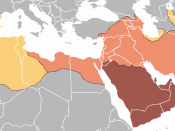Muhammad was an Arabic merchant who lived in the Middle Eastern city of Mecca from 570 to 632. Muhammad brought together the nomadic tribes of the Middle East and drove them on a great conquest which, due to its far and expeditious expansion, is one of the most remarkable empires in history. One of the driving factors behind this vehement expansion is how the Arabic people revolutionized their culture after Muhammad brought them together. Muhammad and his teachings were the force that propelled this culture to establish the vast empire which they would become. The traditional, pre-Muhammad Arab culture was warlike and militaristic, but it lacked a driving force to press it into a large scale conquest. Muhammad's emphasis on spreading Islam by conquering nonbelievers was the encouragement that led the Muslim empire to its prime. Another important military factor was the promise of life after death. This is important to the military because it gave the Arab people incentive to fight in the armies, as all soldiers who died in battle would be granted access to Paradise, or eternal happiness after death.
Also, Muhammad adapted the formerly tribal system of government into somewhat of a monarchy under him. These changes Muhammad brought about were the cause of the spread of the Muslim empire.
The first, and perhaps most important, revolutionary change of the Arab culture is Islam, the religion that unified the tribes of the Arabian Peninsula. Muhammad uses this faith to first conquer the Middle East and then unite it into a vast and powerful empire. This resembles how Genghis Khan unified the warring tribes in Mongolia and conquered a large part of the known world. The pre-Muhammad Arab people were loosely connected tribes that lacked a central government or ruler. These tribes were weak before Muhammad came,


